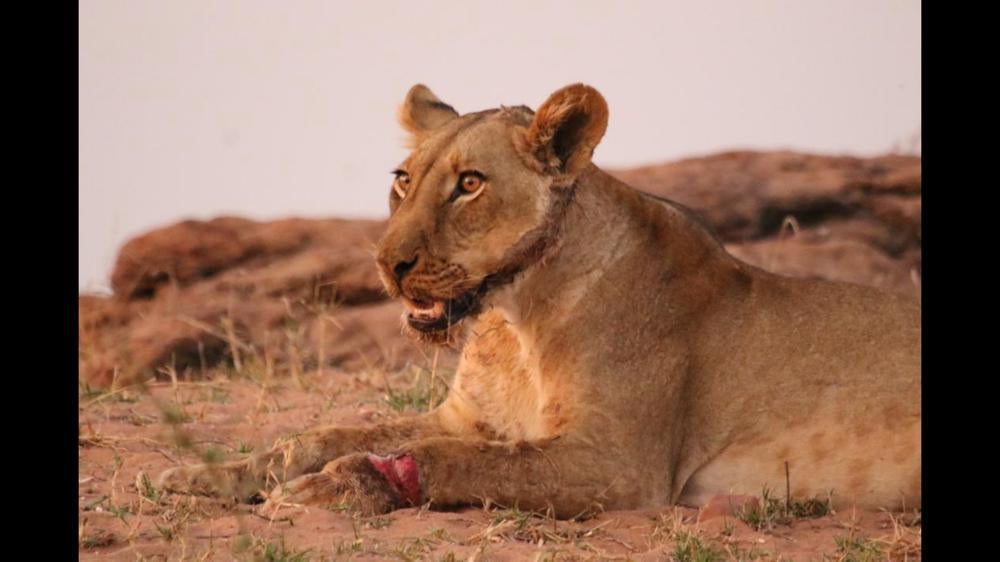Poachers’ snares maim lion, condemn elephant to excruciating death in Zimbabwe
The country’s wildlife authority says removing snares left by poachers is now one of their main daily jobs

Your support helps us to tell the story
From reproductive rights to climate change to Big Tech, The Independent is on the ground when the story is developing. Whether it's investigating the financials of Elon Musk's pro-Trump PAC or producing our latest documentary, 'The A Word', which shines a light on the American women fighting for reproductive rights, we know how important it is to parse out the facts from the messaging.
At such a critical moment in US history, we need reporters on the ground. Your donation allows us to keep sending journalists to speak to both sides of the story.
The Independent is trusted by Americans across the entire political spectrum. And unlike many other quality news outlets, we choose not to lock Americans out of our reporting and analysis with paywalls. We believe quality journalism should be available to everyone, paid for by those who can afford it.
Your support makes all the difference.By Farayi Machamire for Zim Morning Post
A two-year-old lioness is recovering slowly in northern Zimbabwe after breaking several teeth while trying to get free from a brutal wire snare that tore through her mouth and cheeks.
In Charara Safari Area, on the shores of Lake Kariba along the border with Zambia, a young female elephant which spent months in a snare that cut through around her neck and throat, was not so fortunate and recently succumbed to her injuries.
Kariba Animal Welfare Fund trustee Debbie Ottman said the elephant was spotted pouring sand on her neck to try and ease the pain.
“A team proceeded to dart the elephant to remove the embedded wire snare that had cut deeply into her neck and throat and cleaned up the wound, and treated it with strong antibiotics,” Ottman told Zim Morning Post.
“Sadly she passed on after a month of treatment. Her prognosis was not good after removing the wire and finding that it had cut right through into her trachea, a hole right through into her inner throat.”
“The only conciliation is that she had a few weeks of less pain having lived in extreme pain for some months with the deadly wire around her neck and cutting into her throat. Rest in Peace Shinga you are free of the brutal and vicious pain caused by poachers.”
The Trust said the patrols were removing more than 50 snares a month in the areas they cover in the park, with 418 snares having been removed in the year as at August 2022.
As for the lioness, Bumi Hills Anti-Poaching Unit (BHAPU) who saved her life, said she had broken several teeth in her desperate attempts to remove snare wire before being saved.
“The unimaginable suffering this young lioness had to endure is beyond comprehension. This is cruelty in its harshest form,” said BHAPU Base Manager, Catherine Norton.
“Najam is one of the ‘lucky’ ones, but there are many who are not as lucky,” she added.
“Her near-death encounter highlights the need to increase the capacity of the BHAPU team in order to conduct more snare patrols – finding and removing snares, and helping to protect fragile wildlife from these brutal devices.”
In the resort town of Victoria Falls, the Victoria Falls Wildlife Trust team on September 27 found a young elephant trapped in a snare “around the trunk that was so tight the animal was struggling to breathe.”
“Elephants breathe through their trunks not their mouths, and the sound was from the animal trying to breathe,” Victoria Falls Wildlife Trust said in a statement.
“The team quickly darted the struggling animal and fortunately the rest of the elephant herd moved away enough for the team to get in and remove the snare.”
Victoria Falls Wildlife Trust was again on high alert in early October attending to an elephant calf near the border post, which links Zimbabwe to Zambia.
“The young calf had a wire snare wrapped behind the front legs, stretching up to its shoulder line,” the Trust said.
The wire snare was attached to a big piece of metal which was dug into the ground confining the elephant calf to that exact position where it was snared, the Trust added.
Elsewhere, the Zimbabwe Parks and Wildlife Management Authority (ZimParks) Rescue and Veterinary Services Unit team at Hwange National Park was rescuing a Zebra after rangers found it snared by poachers.
According to ZimParks statistics at least 4,523 snares were removed in the year 2021.
ZimParks spokesperson Tinashe Farawo said snare sweeps make up one of the biggest parts of anti-poaching in Zimbabwe.
“The more snares recovered, the less chance of animals meeting a slow and agonising end,” he said.
Meanwhile, people are finding innovative ways to impart anti-snare poaching education. A joint venture between Wilderness Safaris and Ndau Jewellery Community Empowerment in Victoria
Falls is teaching villagers to make jewellery from recycled snare wire.
This article is reproduced here as part of the African Conservation Journalism Programme, funded in Angola, Botswana, Mozambique, and Zimbabwe by USAID’s VukaNow: Activity. Implemented by the international conservation organization Space for Giants, it aims to expand the reach of conservation and environmental journalism in Africa, and bring more African voices into the international conservation debate. Written articles from the Mozambican and Angolan cohorts are translated from Portuguese. Broadcast stories remain in the original language.
Read the original story here:
Join our commenting forum
Join thought-provoking conversations, follow other Independent readers and see their replies
Comments